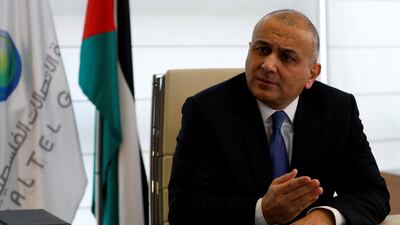Though “too late”, the launch of 3G mobile internet by telecoms operators in the West Bank will help stimulate the territory’s economy, despite Israeli restrictions and Israeli telcos operating illegally there offer faster services, Paltel chief executive Ammar Aker said.
"We are hoping 3G will have a good positive effect on the economy as it has in many other countries," Mr Aker told The National. "The different applications that 3G enables, the investment in IT and start-ups, it has improved everywhere in the world when mobile broadband was introduced."
Paltel and Wataniya Mobile launched 3G – which enables higher speed mobile internet for mobile phone users - in the West Bank last week, after previously having been limited by Israeli restrictions to offering voice, texts, and limited internet services.
“Tens of thousands” of customers have signed up for the new service since its launch a week ago, Mr Aker said. About $40 million was invested in setting up the 3G infrastructure for the West Bank. The West Bank and Gaza have about 3.8 million mobile users. However, Israeli operators have around 450-500,000 users in the West Bank, giving them a market share of 12-15 per cent, Mr Aker said.
Wataniya, which began offering services in the West Bank in 2009, was only permitted by Israeli authorities to begin offering services in Gaza in October 2017. The World Bank estimated in 2016 that Paltel and Wataniya had lost up to $1.5 billion in lost revenue between 2013-15 due to illegal competition from Israeli operators, together with Israeli restrictions.
______________
Read more:
Zain Saudi shares surge on first ever annual profit
Moody’s places Omantel rating on review for downgrade on Zain acquisition
________________
3G, first introduced in European markets around 15 years ago, is significantly slower than 4G, which operators in Israel began offering in 2014.
“Of course it is too late [for us to launch 3G],” said Mr Aker. “We were hoping we could offer 4G but unfortunately the Israeli operators are only letting us use 3G for now, and only in the West Bank and not in Gaza.”
“Israel launched 3G in 2006 and we’re launching it in the West Bank 12 years later, which to be honest is very devastating sometimes.”
Paltel continues to lobby to be able to offer 4G services, but its immediate priority is to be able to offer 3G services in the Gaza Strip, Mr Aker said.
“It might be faster for the time being, and we’ll work on getting 4G any time after that,” he said, saying the timing of such a launch was dependent on discussions at government level.
“We have to keep working with our international friends and the Ministry of Telecom in Palestine to pressure Israel on releasing 3G frequencies for Gaza.”
Israel, which governs the use of radio frequencies by both Israeli and Palestinian operators, has yet to grant the later access to the frequencies required for 4G services.
In November 2015, it gave permission to Palestinian operators to deploy 3G in the West Bank but not in Gaza.
Israeli operators, which include Orange, Cellcom and Pelephone, provide telecoms services to illegal settlements within the West Bank, enabling them to offer coverage throughout the territory.
"As I speak to you in my office, I get coverage from all of the Israeli operators,” said Mr Aker. “We have to compete with Israeli operators, they cover West Bank with much more advanced technology.”
Average revenue per user (ARPU) from Paltel’s subscriber base is set to rise now that 3G services are commercially available.
“We haven’t had any revenue streams from mobile data up to this point, so we hopefully this will generate extra revenues,” he said.
ARPU for West Bank customers is around $8, and between $5-6 in Gaza, he said.

